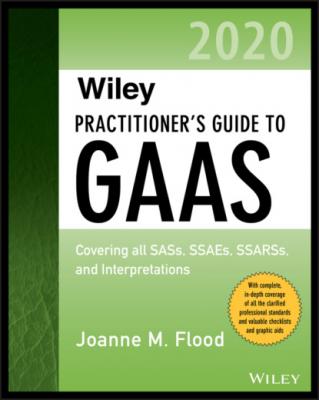Wiley Practitioner's Guide to GAAS 2020. Joanne M. Flood
Читать онлайн.| Название | Wiley Practitioner's Guide to GAAS 2020 |
|---|---|
| Автор произведения | Joanne M. Flood |
| Жанр | Бухучет, налогообложение, аудит |
| Серия | |
| Издательство | Бухучет, налогообложение, аудит |
| Год выпуска | 0 |
| isbn | 9781119596035 |
Ethical Requirements
The auditor must be independent. If not independent, the auditor cannot issue a report under GAAS. The only exception is if GAAS provides otherwise or law or regulation requires the auditor to accept the engagement and report on the financial statements. (AU-C 200.15) In that situation, AU-C 705, Modifications to the Opinion in the Independent Auditor’s Report, applies.
To be independent, the auditor must be intellectually honest; to be recognized as independent, he or she must be free from any obligation to or interest in the client, its management, or its owners. The auditor should be independent in appearance as well as fact. (AU-C 200.A17) For specific guidance, the auditor should look to the AICPA and the state society codes of conduct and, if relevant, the requirements of the Securities and Exchange Commission (SEC). (AU-C 210.A21)
Policies and procedures should provide reasonable assurance that personnel maintain independence when required and perform all responsibilities with integrity, objectivity, and due care.
1 Independence is an impartiality that recognizes an obligation for fairness.
2 Integrity pertains to being honest and candid, and requires that service and public trust not be subordinated to personal gain.
3 Objectivity is a state of mind that imposes an obligation to be impartial, intellectually honest, and free of conflicts of interest.
4 Due care requires the auditor to discharge professional responsibilities with the competence and diligence necessary to perform the audit and issue an appropriate report and to render services promptly, thoroughly, and carefully, while observing applicable standards. (AU-C 200.A19)
(AU-C 200.A16)
(See the AICPA’s Code of Professional Conduct, ET.0.300)
Professional Judgment and Skepticism
Professional Judgment
The auditor must exercise professional judgment in planning and performing an audit of financial statements. (AU-C 200.17-18) The auditor should:
Observe GAAS,
Possess the degree of skill commonly possessed by other auditors, and
Exercise that skill with reasonable care and diligence.
Professional judgment is developed through training and experience. It will come into play in all aspects of the audit, particularly when
Assigning materiality
Assessing audit risk
Evaluating the sufficiency of audit evidence
Evaluating management’s integrity and judgment
Arriving at conclusions
(AU-C 200.A27)
As can be seen from the above list, professional judgment is exercised throughout the audit.
Professional Skepticism
The auditor should also exercise professional skepticism, that is, an attitude that includes a questioning mind and a critical assessment of audit evidence.
In practice, this means that auditors should be alert for:
Contradictory evidence,
Indications of fraud,
Unusual circumstances and those that suggest the need for additional audit procedures,
Evidence that calls into question the reliability of documents and responses to inquiries,
The possibility of collusion when performing the audit, and
How management may override controls in a way that would make the fraud particularly difficult to detect.
(AU-C 200.A22–A.23)
However, the auditor is not an insurer, and the audit report does not constitute a guarantee. It is based on reasonable assurance. Thus, it is possible that an audit conducted in accordance with GAAS may not detect a material misstatement.
Sufficient Appropriate Audit Evidence and Audit Risk
In order to form an opinion, the auditor must obtain reasonable assurance. The auditor obtains reasonable assurance by obtaining sufficient appropriate audit evidence to reduce audit risk to an acceptably low level to draw a reasonable conclusion. (AU-C 200.19)
COMPLYING WITH GAAS
Auditors must comply with and understand relevant AU-C sections, that is, those that are in effect and address the circumstances of the audit. (AU-C 200.20 and .21) GAAS uses two categories of professional requirements to describe the degree of responsibility the standards impose on auditors.
1 Unconditional requirements. The auditor is required to comply with an unconditional requirement in all cases in which the circumstances exist to which the unconditional requirement applies. SASs use the word must to indicate an unconditional requirement.
2 Presumptively mandatory requirements. The auditor is also required to comply with a presumptively mandatory requirement in all circumstances where the presumptively mandatory requirement exists and applies. However, in rare circumstances, the auditor may depart from a presumptively mandatory requirement. The departure should only relate to a specific procedure when the auditors determine that the procedure would be ineffective in the specific circumstances. The auditors must document their justification for the departure and how the alternative procedures performed in the circumstances were sufficient to achieve the objectives of the presumptively mandatory requirement. GAAS use the word should to indicate a presumptively mandatory requirement.
(AU-C 200.25–.26)
The term should consider means that the consideration of the procedure or action is presumptively required, whereas carrying out the procedure or action is not.
AU-C Section 200 also clarifies that explanatory material is intended to explain the objective of the professional requirements, rather than imposing a professional requirement for the auditor to perform.
Gaas and the Gaas Hierarchy
The auditor is responsible for planning, conducting, and reporting the results of an audit according to GAAS.2 GAAS provide the standards for the auditors’ work in fulfilling their objectives. Each AU-C section contains objectives that provide a link between the requirements and the overall objectives of the auditors. Auditors should have sufficient knowledge of the AU-C sections to determine when they apply and should be prepared to justify departures from them.
Interpretive Publications
Interpretive publications are not auditing standards, but are recommendations, issued under the authority of the ASB, on how to apply GAAS in specific circumstances, including engagements for entities in specialized
